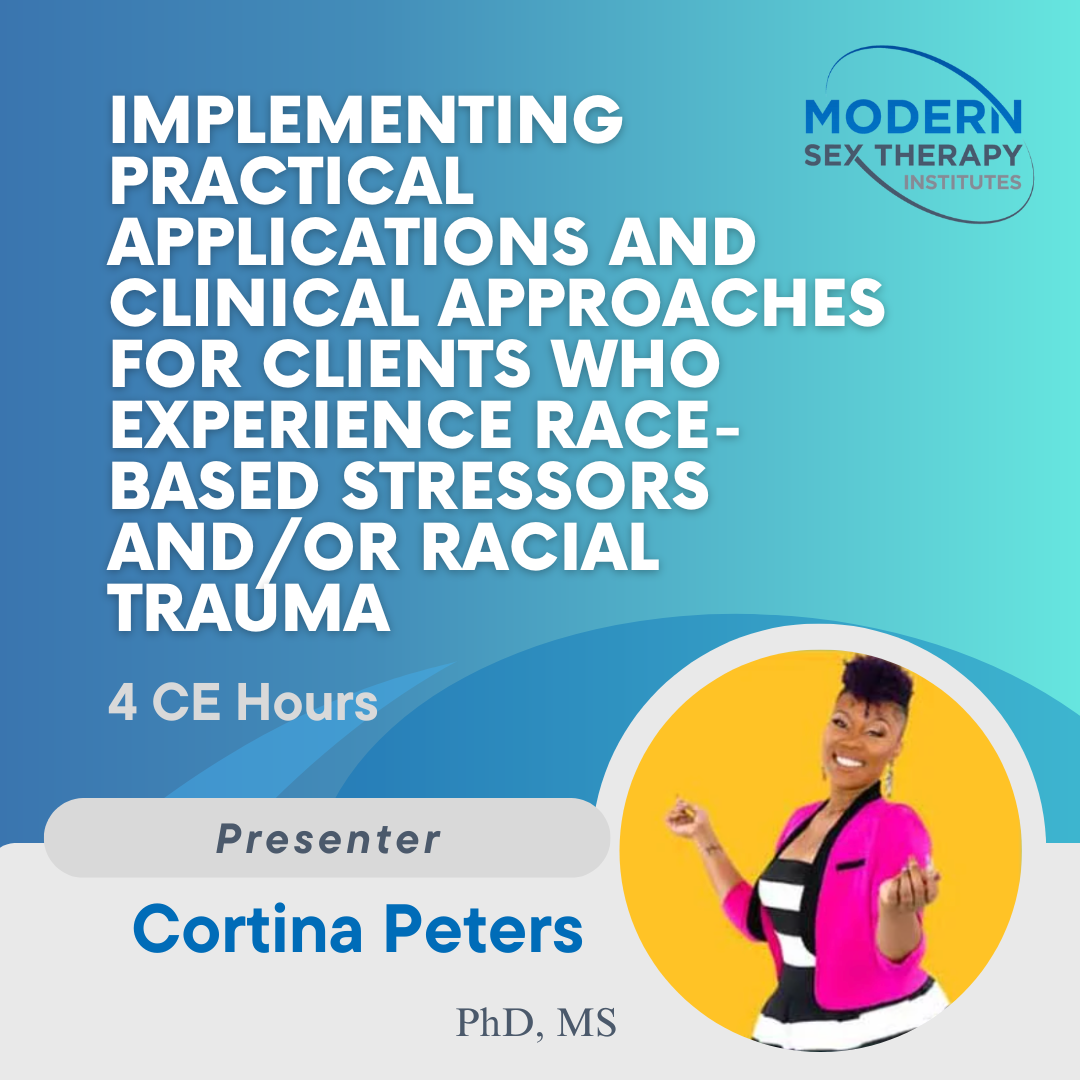Description:
So, you’re comfortable with treating PTSD, but are you comfortable with treating and addressing Racial- Trauma or race-based stressor with the clients you serve? Has the topic of racial trauma or the way in which you discuss race-based trauma or stressors ever come up within your therapy practice? Often, we believe that because an issue does not show up in the therapy room, it’s an indicator that it’s a non-issue. When it comes to issues of race and color, processing stress or trauma induced by race may require a different type of theoretical framework. This training provides a wider perceptual lens to which clinicians can rethink, adjust, and pivot (RAP™) the way they have been providing therapy. It will also challenge clinicians to face barriers that stand in the way of their ability to confidently process and talk about hot topic issues, with clients of color. It will question the notion of “therapy as usual” and empower clinicians to face their own biases, challenge external judgements, and explore ways to validate and hold space for clients experiencing race-based distress or pain. This training will explore the use of different assessment tools that may assist clinicians gathering information about racial stressors, specifically. This training will also provide ways to mitigate countertransference, guilt, and other unpleasant emotions that may arise as a result of working with individuals who have a history of racial trauma/stress. It is the intent of this training to provide a framework and equip clinicians with the knowledge to help clients identify and label sources of race-based stress, support vulnerability, and work through to move past racial trauma(s) and/or race-based stressors.
Learning Objectives:
1. List two assessments tools that measure racial trauma and how these tools can be beneficial when working with closed or resistant clients.
2. Explain how the experience of traumatic racial encounters may go undiagnosed, unaddressed, or unidentified.
3. Describe 2 techniques that clinicians can implement to help address challenges with transference and counter transference.
4. List 2 historical factors that contribute to the experience of racial trauma and or race-based stressors
5. Describe self-limiting beliefs that make it difficult to discuss issues of race and racial trauma within the therapy setting
6. List 3 factors that contribute to unidentified trauma
Implementing practical applications and clinical approaches (by sections)
1. Understanding the why (Getting comfortable)
2. The history
3. Addressing oppression and client resistance
4. Impacts of race related issues as a therapist (Self-work & Reflection)
5. Engagement between the therapist and client
6. Assessments and tools
7. Case scenarios and practical applications
Speaker Bio:
Cortina Peters aka The Girlfriend Therapist TM, is an EMDR trained Licensed Mental Health Counselor who specialized in Sex therapy, International Life Coach, Best Selling Author, Motivational Strategist, and Mentor who motivates people to win every area of their life. She completed both her Master’s in Mental Health Counseling and her Bachelor’s in Psychology at Nova Southeastern University, and received her Ph.D. in Clinical Sexology from Modern Sex Therapy Institutes. She also holds a certificate in Women’s Entrepreneurship from Cornell University.
Cortina started her career in the field of sexual health education and overall wellness over 20 years ago. She has been providing professional counseling services since 2009. She is dually licensed in Florida and Georgia. In 2020, she was nominated as the first black president-elect for the Mental Health Counselors of Central Florida, which covers Lake, Orange, Osceola, and Seminole county.
As The Girlfriend TherapistTM, she helps to dispel the myths of what it means to see a therapist. She has received numerous awards and has been recognized by professional peers, colleagues, and community organizations as a result of the positive work she has done with her patients, clients, and community. Her experience ranges from providing individual counseling sessions to speaking on conference stages in front of large audiences. Be it big or small, she motivates all.
Class originally recorded: 6/22/2024.
Social workers completing this course receive 4 clinical continuing education credits.

